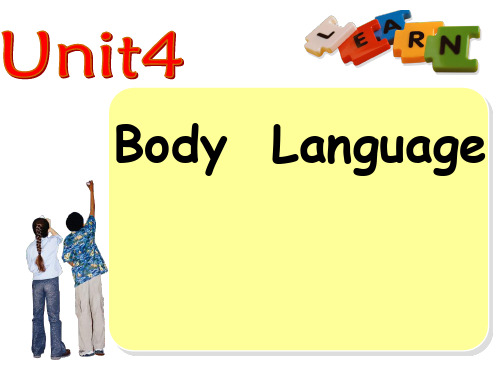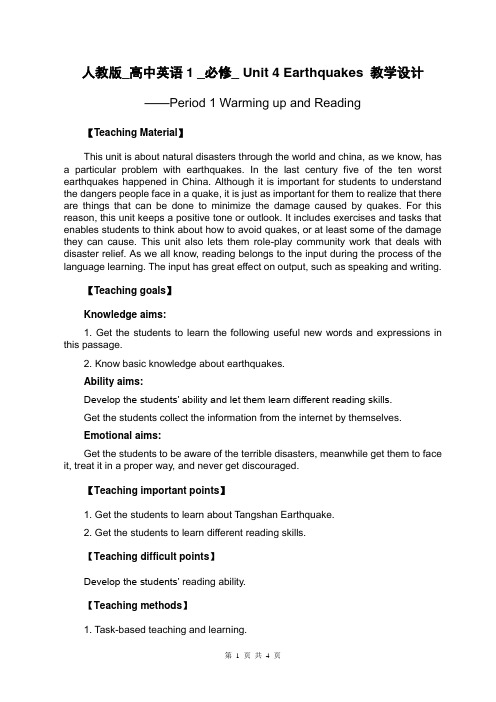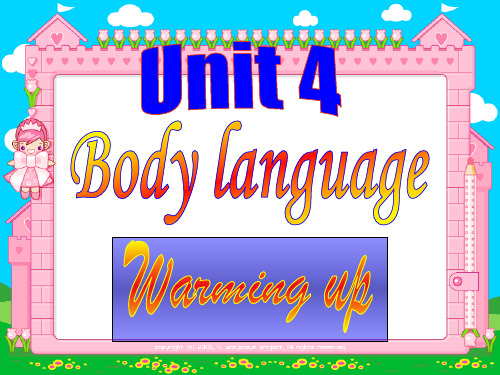新人教版选修4高中英语Unit 4 Period 1 Warming Up Reading课时作业
人教版高中英语选择性必修第四册UNIT 4 Period 1课时作业含答案

UNIT 4Period One基础练Ⅰ.单词拼写1.This morning I received two ________(包裹) from my family.2.What is the number of your ________(邮件) box?3.The small country road is thickly covered with ________(杂草).4.According to the rule,everybody must be dressed in school ________(制服) at school. 5.Her mother is a ________(药剂师)who works in a hospital nearby.6.You can’t pick off the orange before it is ________(成熟).【答案】1.parcels2.mail3.weeds4.uniform5.chemist6.ripeⅡ.单句语法填空1.Could you please give me a bit ________drinking water?2.I don’t think it a good idea to run on this ________(dust) path every morning.3.One day,I ________(do) some exercise in the park when it suddenly began to rain. 4.________(tell) the truth,I don’t think that doctor is of much skill in his work.5.At the beginning of each class,all the students greet the teacher ________ chorus. 6.You’ll have to adapt ________(you) to the new life in your new school as soon as possible. 7.It is known to us all that clothing and ________(house) are two major necessities in our life. 8.Now, I can hear someone ________(quarrel) in the next door.【答案】1.of2.dusty3.was doing4.To tell5.in6.yourself7.housing8.quarrellingⅢ.完成句子1.He can’t even use a mobile phone,________________________.他连手机都不会用,更不用说电脑了。
高中英语人教版必修四 Unit1 Warming up 课件

Elizabeth Fry (1780 --l845), Britain
Guess:
Who was she?
She was Dr Sun Yatsen's wife, was oneChinese history. She concerned herself with welfare projects, especially the China Welfare Institute for women and children.
Unit 1 Women of achievement
Teaching aims
1.To study the new words and expressions 2.To learn about some great women and their qualities and their main achievements.
Guess:
Who was she?
She was an Britain and a Quaker. She helped improve prison conditions and gave prisoners work and education. Her work helped the Quakers get the Nobel Peace Prize in l947.
Who is a great woman?
They are all great women, because: a.They all worked very hard at their chosen careers(事业,生涯); b.They all stuck to their idea without any withdrawal(撤退); c.They had to overcome all sorts of difficulties; d.Sometimes they had to give up many important things (like family or even life )to achieve their ambitions(抱负).
人教高中英语必修4Unit4 Warming-up(共17张PPT)

eye contact
posture
Body language
facial expression
gesture
sign language
II.Warming Up
Let’s play a game.
OK silent
Gestures
stop
well done
Facial expressions
VI.Post-reading
True or false?
1. Most people around the world now great each other by kissing.
2. All members of a culture behave in the same way.
3. Studying international customs can certainly help avoid difficulties in today’s world of cultural crossroads.
happy
angry
sad
puzzled
III.Pre-reading
What do people usually do when meeting?
Different countries have different customs.
China, Britain Russia, France
shake hands kiss
Body Language
I.Lead-in
1.Have you ever watched the film Mr Bean? 2.How is Mr Bean expressing himself?
教学设计_人教版_高中英语1_必修_ Unit 4 Earthquakes_ Period 1 Warming up and Reading

人教版_高中英语1 _必修_ Unit 4 Earthquakes 教学设计——Period 1 Warming up and Reading【Teaching Material】This unit is about natural disasters through the world and china, as we know, has a particular problem with earthquakes. In the last century five of the ten worst earthquakes happened in China. Although it is important for students to understand the dangers people face in a quake, it is just as important for them to realize that there are things that can be done to minimize the damage caused by quakes. For this reason, this unit keeps a positive tone or outlook. It includes exercises and tasks that enables students to think about how to avoid quakes, or at least some of the damage they can cause. This unit also lets them role-play community work that deals with disaster relief. As we all know, reading belongs to the input during the process of the language learning. The input has great effect on output, such as speaking and writing.【Teaching goals】Knowledge aims:1. Get the students to learn the following useful new words and expressions in this passage.2. Know basic knowledge about earthquakes.Ability aims:Develop the students’ ability and let them learn different reading skills.Get the students collect the information from the internet by themselves.Emotional aims:Get the students to be aware of the terrible disasters, meanwhile get them to face it, treat it in a proper way, and never get discouraged.【Teaching important points】1. Get the students to learn about Tangshan Earthquake.2. Get the students to learn different reading skills.【Teaching difficult points】Develop the students’ reading ability.【Teaching methods】1. Task-based teaching and learning.2. Fast reading, intensive reading3. Discussion.【Teaching aids:】CAI课件, A tape recorder【Teaching procedures】Step 1 Warming upWarming up by lookingShow Ss some pictures about natural disasters and ask them two questions.1. Can you tell some natural disasters?(volcano, fire, sandstorm, typhoon, hailstone, thunderstorm, flood, hurricane, earthquake)2. Have you ever experienced an earthquake? Can you describe how terrible an earthquake is?(The earth is shaking; all the buildings will fall down; many people will die; many children will become orphans.)Warming up by discussingNow, look at the pictures of Tangshan and San Francisco in warming up and describe what you see in the pictures.(Beautiful cities; broad roads; tall building; large population...)What will happen if there has been a big earthquake in these two cities?As we all know, earthquakes are disasters to everyone. But can we avoid or at least reduce the loss caused by earthquakes? Can we foretell earthquakes? Now let’s come to Pre-reading and decide what may happen before an earthquake comes.Step 2 Pre-readingImaging and sharingImagine there is an earthquake now. Your home begins to shake and you must leave it right away. You have time to take only one thing. What will you take? Is it money, water, fruits, mobile, phones, a torch light, or anything else? Why?Talking and sharingWhat are the signs of an earthquake? Talk about the pictures on Page 25.(e.g. Cows, pigs and dogs become too nervous too eat. The mice will run out of the fields looking for places to hide. The water in the wells will rise and fall. Walls of the wells in village will have deep cracks. There will be bright light in the sky….) Step 3 ReadingTell the students: Today, we are going to read a news report about the strongest earth-quake in China’s history, which happened in Tangshan, Hebei, in 1976.1. Fast readingAsk the students to read the passage quickly.1) Answer some questions.Ask the students to read the passage quickly and pay attention to the first sentence of each paragraph.2) Find out the topic sentences of each paragraph and get the general idea of the passage.3) Do some true or false exercises.Ask the students to decide whether the following statements are true or false. If it is false, try to correct it.2. Reading carefullyAsk the students to read the passage carefully to lacate particular information.1) Do the exercises in the part Comprehending on Page 27.2) Do some multiple choices.3. Language problemsWhile checking the answers with the whole class,deal with any language problems that the students can’t understand.4. Reading aloudPlay the tape of the passage for the students to listen and follow. Then play the tape of Paragraph 1 of the passage once more; this time the students listen and repeat.Step 4 GameWork in pairs. Supose you are a newspaper reporter, and other is a witness of the 1976 Tangshan Earthquake. Now the newspaper reporter is interviewing the witness.Step 5 DiscussionHow can we protect ourselves in the earthquake?Earthquake Survival TipsDriving --- pull over and stay in your car.In a building--- get near a strong wall / The corner of the room is the safest.Having classes--- listen to the teacher’s instruction, protect their heads and hide under the desks.On buses--- Grasp the handles to avoid being injured; lower the center of gravity; hide near the seats; get off after the earthquake passed.Step 6 HomeworkP review the reading “A Night the Earth didn’t Sleep” and learn new words of this unit.。
人教版高中英语必修四unit 1warming-up(共39张ppt)

Empress Wu Zetian (624-705), Tang Dynasty
7
She was a doctor who became a specialist in women’s illnesses. She devoted all her life to medical work for Chinese women and children. Her work encouraged many other women to become doctors.
with their getting into family of
illness and medical her own.
health college and
getting
further
training.
20
Name Ambition Problems Sacrifices
Jane To work She lived She gave
23
Talking
Do you know a woman who really inspires or encourages you? Describe her and explain why.
Tips: What does she look like? What do you think about…? What are her reputation? Why do you admire her? What are her contribution? How would you describe her?
Elizabeth To help She was Less time
Fry
improve criticized was spent
高中英语人教版必修四_Unit1_Warming_up_课件

modest warm-hearted
helpful responsible
honest
independent
broad-and-open minded
Who is a great woman?
They are all great women, because: a.They all worked very hard at their
What do they have in common?
unselfish
active
intelligent Personal determined qualities
generous of the great
hard-working brave confident
kind
people
considerate
chosen careers(事业,生涯); b.They all stuck to their idea without any
withdrawal(撤退); c.They had to overcome all sorts of
difficulties; d.Sometimes they had to give up many
Unit 1 Women of achievement
2020/7/26
Teaching aims
▪ 1.To study the new words and expressions
▪ 2.To learn about some great women and their qualities and their main achievements.
Welfare Institute for
最新人教英语必修四Unit4Section1WarmingupReading课件课件PPT

2.Match each part with the main idea.
• Para.1
• A.The cultural mistakes of
• “body language”
• Para.2&3
• B.Different body languages in
following questions
(1)Which sentence in the passage is the closest in meaning to the following one.
Tony came close to Julia, placed his hand on her shoulder and gave her a kiss!
(3)Can we expect people everywhere to act the same? Why?
No. Because people from different cultures or countries
_______________________________________ ______.
_____________________________
(2)Fill in the blanks according to the passage.
Akira Nagata from Japan ________ to George Cook from Canada and his nose ________
人教英语必修四 Unit4Section1Warmi
ngupReading课件
Section Ⅰ
人教高中英语必修4Unit4Warming up(共21张PPT)

Ways of communicating speaking
Spoken language ringing
writing Written language
typing
Body language gesturing
welcome
kiss your hand to sb./blow a kiss
babykiss
It means rude in Nigeria. It means No.1 in German & Japan.
5.What does the gesture for OK means in different countries ?
It means money in Japan.
It means zero in France.
Body language.
2. Do people express their thoughts and opinions and communicate with others only by words? What other ways can be used?
By words & by our expressions and
know direct meaning by words body language can’t express complex thoughts, opinions and views express our thoughts and opinions
communicate with other people
body movements words
Body Language
our expressions
- 1、下载文档前请自行甄别文档内容的完整性,平台不提供额外的编辑、内容补充、找答案等附加服务。
- 2、"仅部分预览"的文档,不可在线预览部分如存在完整性等问题,可反馈申请退款(可完整预览的文档不适用该条件!)。
- 3、如文档侵犯您的权益,请联系客服反馈,我们会尽快为您处理(人工客服工作时间:9:00-18:30)。
Period One Warming Up & ReadingⅠ.用适当的介、副词填空1.We would take them first ________ their dormitories and then ________ the student canteen.2.After half an hour ________ waiting ________ their flight to arrive,I saw several young people enter the waiting area looking ________ curiously.3.After I met them and then introduced them ________ each other,I was very surprised.4.________ the same way that people communicate ________ spoken language,they also express their feelings using unspoken “language” ________ physical distance,actions or posture.5.Then Akira Negata ________ Japan came ________ smiling,together ________ George Cook from Canada.6.As they were introduced,George reached his hand ________ to the Japanese student.7.When we met yesterday,he moved very close ________ me as I introduced myself.8.When Darlene Coulon from France came dashing ________ the door,she recognized Tony Garcia’s smiling face.9.They shook hands and then kissed each other twice ________ each cheek.10.Ahmed Aziz,________ the contrary,simply nodded ________ the girls.Ⅱ.佳句翻译与仿写1.After half an hour of waiting for their flight to arrive,I saw several young people enter the waiting area looking around curiously.翻译____________________________________________________________________ ________________________________________________________________________ 仿写(1)他站在那里时看到两个人进入了超市。
As he stood there ________________________________________________.(2)他坐在扶手椅上看报纸。
He sat in the armchair ________________________.2.The first person to arrive was Tony Garcia from Colombia,closely followedby Julia Smith from Britain.翻译_____________________________________________________________________ ________________________________________________________________________ 仿写(1)上个星期你是第一个到会的人。
You were ________________________________________________ last week.(2)我儿子高兴地对我说他是他们班第三个完成作业并且惟一一个得满分的人。
My son told me gladly that he was the third person ________________________ and the only one ________________________________________.3.Not all cultures greet each other the same way,nor are they comfortable in the same way with touching or distance between people.翻译_____________________________________________________________________ ________________________________________________________________________ 仿写(1)我跑不了那么快,你也不行。
I can’t run that fast,________________________.(2)我再也没见到他,也没有收到他的信。
I never saw him again,________________________________________________.4.I have seen,however,that cultural customs for body language are very general—not all members of a culture behave in the same way.翻译_____________________________________________________________________ ________________________________________________________________________ 仿写(1)我们班并非所有的男生都喜欢打篮球。
________________________________ like playing basketball.(2)并不是所有的零件都是那个工厂生产的。
________________________ are made in that factory.Ⅲ.单项填空1.Yesterday,another student and I,________ our university’s student association,went to the Capital International Airport to meet this year’s international students.A.presenting B.representingC.taking the place of D.instead of2.The first person to arrive was Tony Garcia from Colombia,closely ________ by Julia Smith from Britain.A.followed B.followingC.follow D.to follow3.Men from Middle Eastern and other Muslim countries will often stand quite ________ to other men to talk but will usually not touch women.A.close B.closelyC.closed D.closing4.However,people from places like Spain,Italy or South American countries approach others closely and are more ________ to touch them.A.possible B.probableC.likely D.perhaps5.These actions are not good or bad,but are simply ways ________ cultures have developed.A.that B.in whichC./ D.all the above6.________,though,studying international customs can certainly help avoid difficulties in today’s world of cultural crossroads!A.In common B.In generalC.In total D.In advance7.Tony approached Julia,________ her shoulder and kissed her on the cheek!A.touches B.touchedC.touching D.to touch8.She stepped back ________ surprised and put up her hands,________ in defence.A.appearing;even if B.appeared;as ifC.appearing;as if D.appeared;even if9.Most people around the world now greet each other by shaking hands,but some cultures use other greetings ________,such as the Japanese,who prefer to bow.A.as well as B.eitherC.as good as D.as well10.Do you agree with the author’s statement ________ body language is not good or bad?A.which B.who C.that D./Ⅳ.阅读理解In the world of communication,we focus a lot on what our customer is saying,which includes understanding their body language and gestures.But we must not forget that it is equally important to pay attention to our own body language and gestures when communicating with others.In our personal and business lives,careful consideration must be given to whom we are with and where they are from.One thing for sure is that failure to be prepared when dealing with other cultures can be rather embarrassing.Many years ago,the then President of the United States,Richard Nixon arrived in a foreign country in South America and upon his arrival,stood at the top of the stairs leading to the side door of his Presidential Jet.As he looked over the crowd below him,he had a great smile and proudly raised both hands high in the air,palms facing outward and the index and third fingers raised,and gave a gesture of the famous “Peace” sign as he had done so often before.Immediately,the crowd below began to jeer(嘲笑) at the President who couldn’t figure out why all of a sudden,he was receiving such a rude welcome.The reason was that in the country he was visiting,the twofingered,palms outward “Peace” sign,which was acceptable in North America,was an absolutely offensive symbol to the local people.As you can see,it is really important to know your audience and if travelling to other countries,you need to be aware that some of the most commonly acceptable gestures at home can have a completely different meaning abroad.In some countries such as France and Italy,it is acceptable to exchange a kiss on one or both cheeks while shaking hands upon entering or exiting a business meeting.In other countries such as Japan,this type of behavior is considered impolite as Japanese are not a “touch oriented society”.The Japanese have a respectful custom to bow to each other with the most senior status person bowing the least and the least status person having to bow first and display the deepest bend from the waist.1.In Paragraph 1,the author mainly asks us to pay attention to ________.A.our mannersB.our body languageC.words of our customersD.the way of communication2.President Richard Nixon was laughed at because he ________.A.stood at the top of the stairsB.looked over the crowd below himC.raised both hands high in the airD.gave a gesture of the “Peace” sign3.The author mentions President Richard Nixon’s story to show that ________.A.the crowd were rudeB.gestures vary in different culturesC.Richard Nixon was unfriendlyD.Richard Nixon loved peace4.Which of the following is the gesture President Nixon gave?5.According to the passage,we know ________.A.Japanese think exchanging a kiss is acceptableB.French people can’t accept the behavior of shaking handsC.in Japan,the senior people needn’t bow to othersD.in Japan,the degree of bowing is connected with people’s statusapproach,way,means,method四者都有“方式/方法/途径”之意,但approach侧重指待人接物或思考问题的方式;way为一般用语;means指可以得到结果的方法;method指有规律的、有条理的做法。
